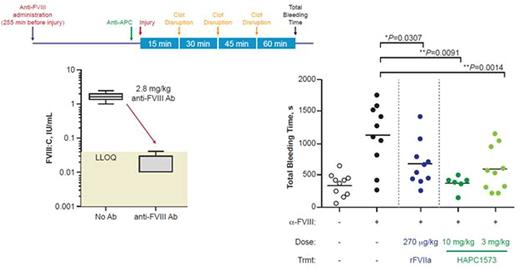Abstract
In patients with hemophilia, hereditary defects in coagulation factors result in unstable clots and recurrent bleeding. Although the current standard of care focuses on replacement factor therapy, we propose that inhibition of the anticoagulant pathways may offer novel therapeutic opportunities. Activated protein C (APC) is one of the major anticoagulants, which works by degrading factors Va and VIIIa to maintain hemostatic balance. APC also exhibits cytoprotective effects, which include antiapoptotic effects, endothelial barrier protection, and anti-inflammatory effects. Antibodies are ideally suited to inhibit the anticoagulant activity of APC while preserving its cytoprotective activity.
We have developed an anti-APC monoclonal antibody (mAb), HAPC1573 (murine immunoglubulin G1/kappa), using hybridoma technology, that specifically binds to human APC (hAPC) at 3 to 7 nM binding affinity (Kd) but not to its zymogen, protein C (PC) as determined by surface plasmon resonance (SPR) using a Biacore T200 instrument (GE Healthcare, Pittsburgh, PA). To investigate the binding epitope of mAb HAPC1573, APC was inhibited with Phe-Pro-Arg-chloromethylketone (PPACK). PPACK is an irreversible inhibitor of APC and forms a covalent bond with the catalytic triad Ser195 (chymotrypsin numbering).
HAPC1573 bound comparably to PPACK-hAPC and untreated hAPC coated on an enzyme-linked immunosorbent assay (ELISA) plate, suggesting that the binding epitope of HAPC1573 is located outside the active site of APC. These ELISA results were also confirmed by SPR analyses. HAPC1573 inhibited the cleavage of a small peptide substrate Spectrozyme PCa (Sekisui Diagnostics, Lexington, MA) by hAPC up to 40%. The antibody protected factors Va and VIIIa from APC-mediated inactivation in a dose-dependent manner. HAPC1573 significantly reduced activated partial thromboplastin time of hemophilic plasma and enhanced thrombin generation (assessed by thrombin generation assay) in the presence of thrombomodulin. HAPC1573 inhibited the anticoagulant activity of APC without affecting its cytoprotective functions, as measured by histone-mediated cytotoxicity assays on human umbilical vein endothelial cells (up to 300 nM HAPC1573). Given its cross-reactivity with monkey APC, the antibody was evaluated in Cynomolgus monkeys for therapeutic efficacy and safety. Intravenous administration of the antibody at 3 and 10 mg/kg significantly shortened bleeding time after injury and restored hemostasis in a dose-dependent manner in an anti-FVIII antibody-induced hemophilia monkey model (Figure). Administration of a sheep-anti-FVIII antibody (Haematologic Technologies, Inc., Essex Junction, VT) reduced plasma FVIIIa activity to below the lower limit of quantification (LLOQ; Figure [left panel]) and led to a significantly longer bleeding time in normal monkeys (Figure; right panel), recapitulating the hemophilia A phenotype. This prolonged bleeding time was partially reduced by 270 µg/kg of recombinant factor VIIa (rFVIIa; NovoSeven, Novo Nordisk, Plainsboro, NJ) used as a positive control for these studies. There was a statistically significant dose-dependent reduction in bleeding time by HAPC1573 with the 10-mg/kg dose restoring the bleeding time back to normal.
This study provides in vivo proof of concept of using anti-APC antibody for hemophilia. HAPC1573 represents an anti-APC antibody with therapeutic utility for patients with hemophilia with inhibitors.
The efficacy of HAPC1573 evaluated in an anti-FVIII antibody-induced hemophilia monkey model.
The efficacy of HAPC1573 evaluated in an anti-FVIII antibody-induced hemophilia monkey model.
Zhao:Bayer Pharmaceuticals: Employment. Yegneswaran:Bayer Healthcare Pharmaceuticals: Employment. Sim:Bayer: Employment. Patel:Bayer Pharmaceuticals: Employment. Schneider:Bayer HealthCare LLC: Employment, Patents & Royalties. McLean:Bayer: Employment, Equity Ownership. Zhu:Bayer Healthcare: Employment. Jiang:Bayer Pharmaceuticals: Employment. Gu:Bayer Pharmaceuticals: Employment. Ivens:Bayer Pharmaceuticals: Employment. Xu:Shanghai RAAS Blood Products Co.Lt: Employment, Membership on an entity's Board of Directors or advisory committees, Patents & Royalties: Patent. Bringmann:Bayer Corporation, Parmaceuticals Division: Employment. Kauser:Bayer: Employment.
Author notes
Asterisk with author names denotes non-ASH members.


This feature is available to Subscribers Only
Sign In or Create an Account Close Modal